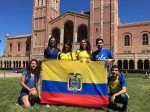Manying Ng-Argudo’s family was at a mall in Ecuador when an earthquake struck. The mall’s electricity was cut and people began to jump from the second floor to the first in panic to avoid getting trapped on escalators and inside elevators.
Ng-Argudo, a fourth-year psychology student, and other Ecuadorian students at UCLA recounted how they rushed to contact their families abroad after a magnitude-7.8 earthquake hit Ecuador on April 16. About 650 people died and more than 12,000 were injured in the disaster, according to a CNN report.
On April 18, three members of the Ecuadorian Bruins club, including UCLA alumna Andrea Valencia and Ng-Argudo, attended a meeting at the Ecuadorian Consulate in Los Angeles to find out how they could assist relief efforts from afar by sending money and other donations.
Valencia and Ng-Argudo returned to UCLA and met with other members of Ecuadorian Bruins on Saturday morning to further discuss how to help their families and others affected.
“We are far away from home, but that is not a reason not to do anything,” Valencia said. “Not helping is not an option.”
Bernardo Andres Cobos, a fourth-year mathematics student, said he called his mother as soon as he heard about the earthquake to make sure she was safe.
Cobos said his mom planned to attend an event, but decided to run errands instead. The event venue collapsed, and the building’s owner and his daughter both died.
Luckily, Cobos’ mother, Karina Galvez, was inside a taxi in Guayaquil, Ecuador, about 178 miles away from the epicenter. When she got home, she was greeted with broken glass, pots and fallen shelves scattered across the floor.
More than one week after the earthquake, bodies are still buried beneath rubble in beach towns, Galvez said.
“The unbearable smell of death covers some towns that were flattened by the earthquake,” she added.
Ng-Argudo said the phone lines were congested in cities surrounding the epicenter, so people had to depend on social media to contact their family members. She said she received multiple Facebook notifications after the earthquake hit, alerting her that her friends were safe.
Ng-Argudo said she was glad she was able to use social media platforms like Facebook or WhatsApp to communicate with her family, but some news shared on Facebook wasn’t reliable because posts were sensationalized, she said.
Jhon Cruz, a third-year microbiology, immunology and molecular genetics student, said he did not have a phone at the time of the incident, so he read news of the disaster on a friend’s phone. Cruz said he was even more worried because major news outlets were not providing coverage of the epicenter hours after the earthquake.
“I was shocked because I was born and raised in Ecuador,” Cruz said. “And in my whole life, I’ve never experienced anything like this in my home country.”
He added a bridge collapsed in his hometown of Guayaquil, killing at least one person. Cruz said his extended family gathered under his parents’ roof to stay close to each other in case another earthquake hit.
He had just finished talking to his mom on the phone when an aftershock hit at 2 a.m. He immediately called her back and she confirmed they were fine, but their fear of disastrous aftershocks kept them awake that night, Cruz said.
Ng-Argudo said she hopes all members of the UCLA community will help provide assistance even if they aren’t personally connected to Ecuador. Ecuadorian Bruins started an online funding page to help raise money for relief efforts.
